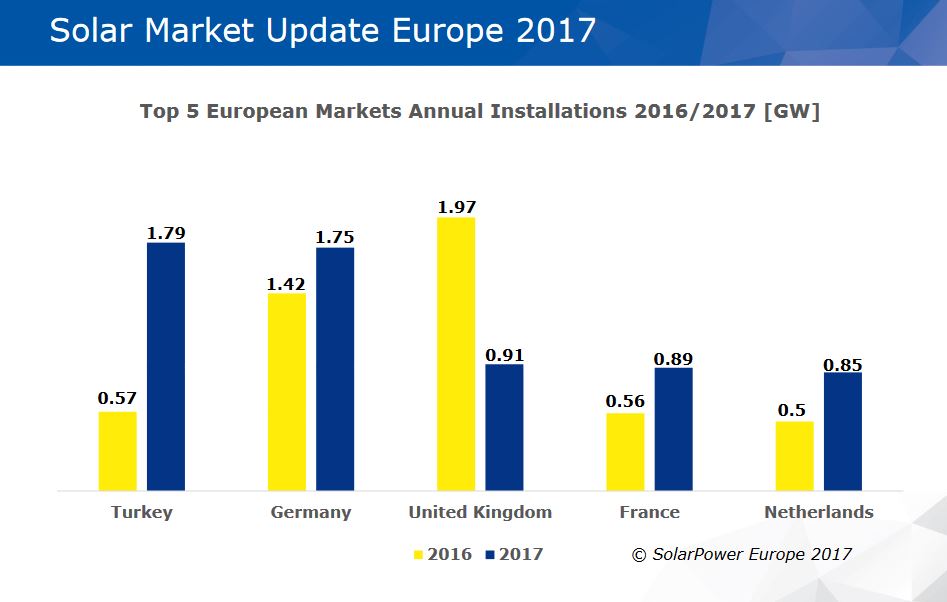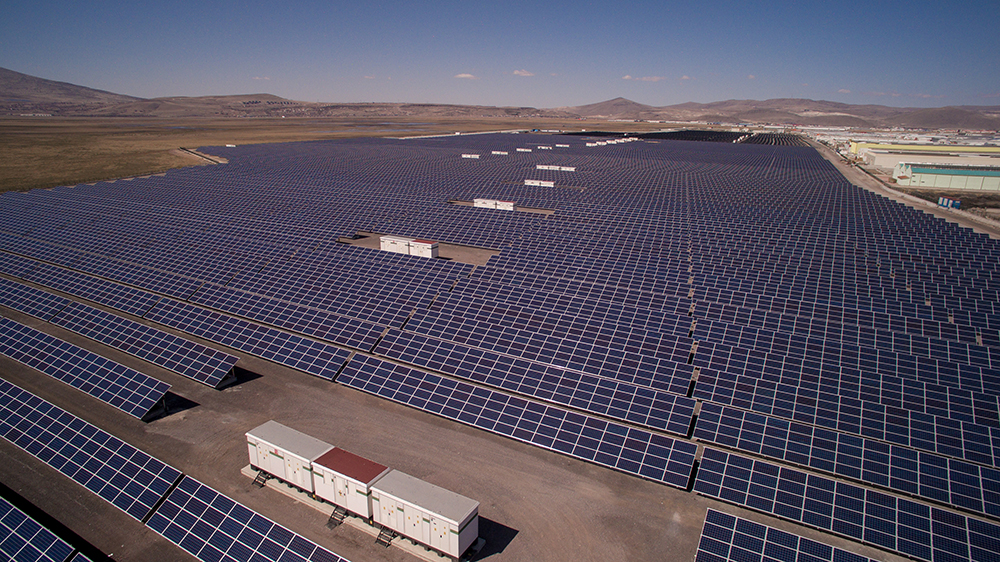European solar body, SolarPower Europe has estimated that the continent installed 8.61 GW of new PV capacity in 2017 – a 28% increase on the previous year.
Leading the charge was Turkey, which installed 1.79 GW of new capacity over the 12 months of the year, as pv magazine reported early in January.
For EU Member States, which is a collection of 28 nations that does not include Turkey, the growth was a more modest 6%, with 6.03 GW installed in 2017, against 5.69 GW in 2016.
By both metrics, however, the steady growth is an encouraging sign for Europe. The data prompted SolarPower Europe CEO, James Watson to urge the EU to adopt greater measures to support the sector’s expansion.
“If the trade measures on imported solar panels were removed, according to a DG Justice and Consumers study we could see an increase in solar consumption in the EU of around 20-30%,” Watson said. “Likewise, if the EU adopted a 35% renewable energy target, instead of today’s 27%, no fewer than 300,000 new solar jobs could be created.”

Turkey leads the way
Turkey’s 1.79 GW of new capacity in 2017 represented a massive 213% market growth in the space of a year, and saw the nation supplant Germany as Europe’s most dynamic solar market last year.
There was a confusion recently about Turkey's installations in 2017, with many in the market arguing that Turkey added 1.17 GW of PV capacity in December alone. Such reports were misled by Turkey's Electricity Transmission Operator's (TEIAS) annual statistics, which in January decided to include PV projects that are near completion and not yet connected to the grid, on the 2017 spreadsheet.
SolarPower Europe comments today that “Turkey saw an end-of-year rush with around 800 MW of solar systems either under construction or installed, but which were not fully up and running in 2017.” This 800 MW solar PV capacity is expected to come online over the next few months.
Germany installed a credible 1.75 GW of new solar capacity – which represented 23% growth – while in third place, news of the U.K.’s 912 MW solar splurge was sullied by the fact that this figure represents a 54% decline in new capacity against 2016, as solar subsidy programs were scaled back further.
France and the Netherlands both performed strongly, installing 887 MW and 853 MW, respectively to both post double-digit growth. It is expected that these two countries will grow further in 2018, following the introduction of more favorable support mechanisms for renewables.
Former shining star, Spain may have only installed 135 MW of new PV capacity in 2017, but that performance is cause for mild optimism given that it represents growth of 145% on 2016, when a mere 55 MW of capacity was installed.
“We are expecting strong growth in the coming years as several EU member states are choosing solar to meet their national binding 2020 renewables targets,” said Michael Schmela, executive advisor and head of market intelligence at SolarPower Europe. “This makes perfect sense as solar is the most popular energy source among EU citizens, due to its low-cost, versatility and reliability.”
pv magazine will provide an in-depth update on the Turkish solar market in its March issue, published March 12 and available at SolarPower Europe's Solar Summit, held in Brussels between March 14-15.
This content is protected by copyright and may not be reused. If you want to cooperate with us and would like to reuse some of our content, please contact: editors@pv-magazine.com.



6 comments
By submitting this form you agree to pv magazine using your data for the purposes of publishing your comment.
Your personal data will only be disclosed or otherwise transmitted to third parties for the purposes of spam filtering or if this is necessary for technical maintenance of the website. Any other transfer to third parties will not take place unless this is justified on the basis of applicable data protection regulations or if pv magazine is legally obliged to do so.
You may revoke this consent at any time with effect for the future, in which case your personal data will be deleted immediately. Otherwise, your data will be deleted if pv magazine has processed your request or the purpose of data storage is fulfilled.
Further information on data privacy can be found in our Data Protection Policy.